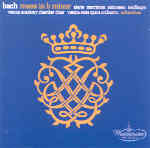The opening Kyrie of Hermann Scherchen’s idiosyncratic B minor Mass may shock newcomers to this long-controversial performance due to its glacial pace–but the shock, or at least puzzlement, tends to wear off with repetition, for Scherchen’s interpretive template appears to alternate slower-than-usual slow movements with faster fast movements. The dawdling Kyries, for example, flank a flowing Christe eleison, and the pattern of strongly contrasted movements continues throughout. This works in general, though the Kyrie drags because Scherchen and/or his players don’t infuse the music with either the rhythmic spring or the granitic power of, for example, Klemperer’s Kyrie in his EMI recording of the Mass, which also is taken at a slightly faster clip.
Once past the Kyrie, we’re in more comfortable territory with an overall performance admirably close to the heart of this great work as generally interpreted by Bachians circa 1959–i.e., largish forces, modern instruments, and operatic voices. That’s still a successful formula for many of us not fully committed to the “historically informed” fashion. For instance, we’re not likely to hear from authentic instruments the melting sweetness of Willy Boskovsky’s violin in the Benedictus, nor his warmth and long-breathed phrasing. There also are some lovely uncredited flute solos, and while the chamber choir employed here doesn’t have the transparency or tonal beauty of some of our best contemporary early music choruses, it certainly proves more than adequate.
Soloists are led by tenor Leopold Simoneau, whose every appearance is a cause for joy. The voice is a marvel: mellifluous without being cloying, the phrasing perfection itself, the feeling strong in every bar. His Boskovsky-accompanied Benedictus alone is worth the price of this set. Mezzo Nan Merriman has a lighter voice than we often hear in this work, but her poised singing is a highlight of the performance and her Agnus Dei is suffused with emotion and is alive to the text. The high soprano of Pierette Alarie (Mrs. Simoneau) is attractive without the distinctiveness others have brought to the part. The weak link is bass soloist Gustav Neidlinger, whose scooping, aspirated, hectoring Quoniam and Et in Spiritum Sanctum are downright awful. Too often he sounds like an Alberich wandering in from Wagner’s Ring.
Westminster claims 96/24 digital remastering from the original mastertapes but the results strike me as inferior to the AAD 1985 CD release as an MCA Classics Doubledecker, which had more natural sonics, set singers and musicians behind the speaker plane, and surrounded them with more air. The new remastering moves everyone forward at the expense of hall sound and doesn’t help the solo singers, exaggerating Merriman’s vibrato in the Agnus Dei, for example, and reducing the emotional impact of her singing. But for all its flaws, this is a performance too long out of the catalog and it deserves a hearty welcome back.
































